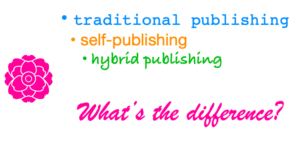Self published books (usually hyphenated to self-published) are more than a trend.
I previously blogged about traditional publishing— take a look at the post if you are interested in learning more about the traditional publishing route. But many authors choose to go the self-publishing route instead.
Why Self Published Books?

What if you can’t find a literary agent willing to represent you? Or, what if you are fed up with the waiting process and want to take matters into your own hand? Perhaps you want to retain total control of your book project.
Well, self-publishing is exactly that — taking charge of your book’s publication. You can format your book yourself (usually at a 6×9 trim), design the book cover, upload it to Amazon with your own listing description, and market it by yourself.
FREEDOM! Or, maybe not. The downsides to self-publishing are listed below.
- There is no advance on sales.
- The formatting stuff may sound like Greek, especially for the less tech savvy among us.
- You may have no idea how design a book cover.
- So, you hire contractors — a book formatter and a graphic designer — to do it for you. Their work can be white-labeled, meaning their names won’t appear anywhere in the book.
And… There’s Also Hybrid Publishing
Honestly, hybrid publishing is still a rather new phenomenon, sort of a cross between traditional and self-publishing. Hybrid publishers come in all shapes and sizes and operate with a revenue model that certainly differs from traditional publishing. It’s basically a service that may or may not pay you an advance on sales. In fact, you generally have to pay the service to do everything for you.
- You don’t need a literary agent to work with a hybrid publisher.
- The hybrid publisher may offer editing services for a fee, but your book should already be edited before you endeavor to get it on the market.
- The hybrid publisher attends to your formatting and design for both e-book and print.
- There is no white labeling at all — you have a “publishing house” attached to your book
- The hybrid publisher might pay you royalties, but probably not.
- They hybrid publisher should help promote your book, but again, you are expected to do a lot of self-marketing.
Have Questions? Let’s Collaborate.
Please contact me at melaniesaxton@icloud.com to discuss your book project. I’ll do my best to answer your questions and work elbow-to-elbow as we get your book written and edited.
